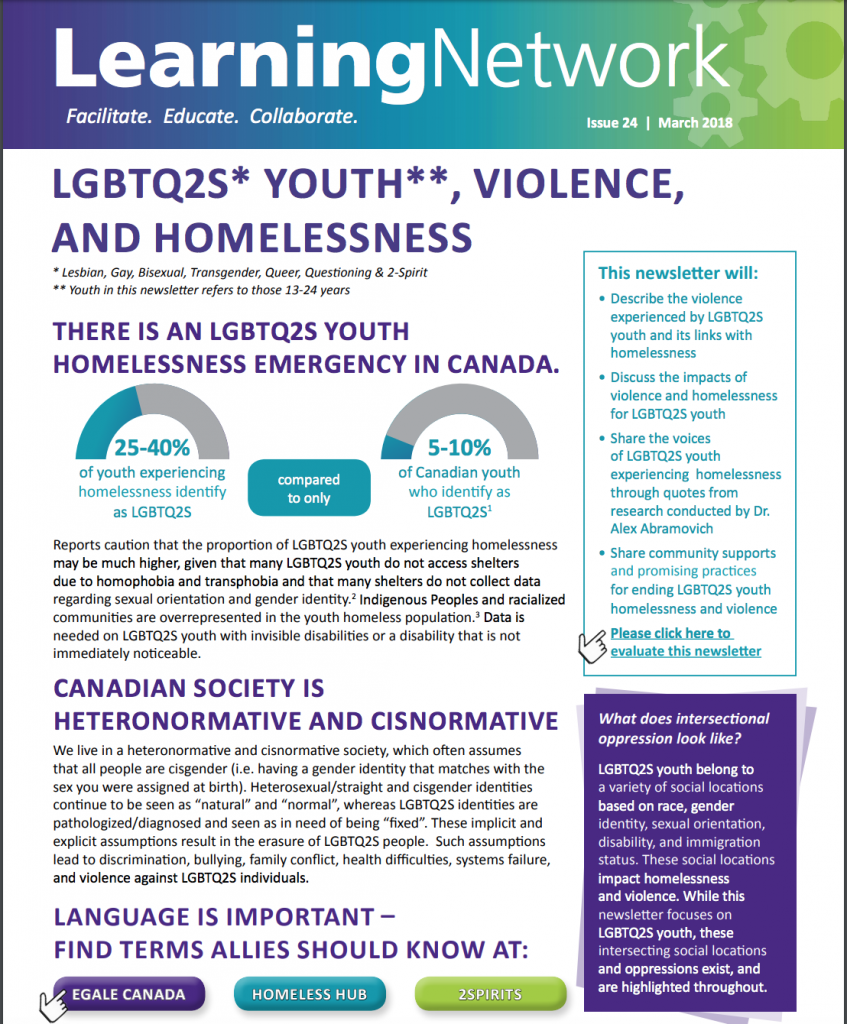Contemporary Two-Spirit Issues
This week we read ‘Homeless & Street-Involved Indigenous LGBTQ2S Youth in British Columbia: Intersectionality, Challenges, Resilience & Cues For Action’ by David Kirk et al. This article highlighted how street-involved LGBTQ2S Indigenous youth experience more adversity than their heterosexual and cisgender Indigenous peers and their non-Indigenous LGBTQ peers. Some of the data presented in this article includes:
- More than two-thirds (69%) of Indigenous LGBTQ2S youth experiencing homelessness had been in government care at some point (e.g. foster care) (p.23)
- 62% of Indigenous LGBTQ2S youth reported that one or more of their close relative were survivors of residential schools (p. 23)
- Indigenous LGBTQ2S youth were more likely to have ever been sexually abused (61%) than their heterosexual cisgender peers (p. 24)
- 75% of Indigenous LGBTQ2S youth reported experiencing discrimination in the previous year (p. 24)
Upon reflecting on this data, it is evident that Indigenous LGBTQ2S youth are at a higher risk of experiencing a multitude of adversities. Adding insult to injury, the article finds that “Indigenous LGBTQ2S youth were more likely to report having missed out on needed medical care in the previous year” (compared to Indigenous heterosexual cisgender youth) (p. 27).
In my opinion, this article exemplifies the devastating and lasting legacy of colonialism and of the residential school system in Canada. Prior to settler contact, colonialism, and assimilation policies, Indigenous peoples in (what is now known as) Canada recognized different genders and sexualities: one example of this is the Two-Spirit identity. It can be argued that the adversities faced by Indigenous LGBTQ2S youth are the result of colonialism—in a traditional setting, these youth would be accepted (and even celebrated).
Various factors result in youth homelessness, but many of these factors often stem from challenges faced during childhood. As the data in this article shows, many of these youth have families who have been impacted by the residential school system. Among the devastations brought about by the residential school system is the generation of now-parents who experienced abuse during childhood and were not raised by their families. In many instances, the lasting traumas of this abuse echo into the lives of their children—the lives of Indigenous LGBTQ2S youth. The history of colonialism echoes of course also through the prevalent stereotypes and racist opinions/behaviours about Indigenous peoples present in our society—this contributes to the experiences of Indigenous LGBTQ2S youth as well.
While this is has been an over-simplification of a very complex issue, it draws attention to some of the reasons why LGBTQ2S youth experiencing homelessness do (or have) experienced violence, mental health problems, and lack of access to services. In my opinion, they key to helping homeless LGBTQ2S+ youth starts at addressing the intergenerational trauma caused by colonialism and colonization, especially, the residential school system, by way of providing support and acknowledging the wrong doings of the Canadian government both past and present.
